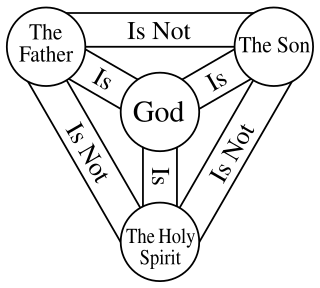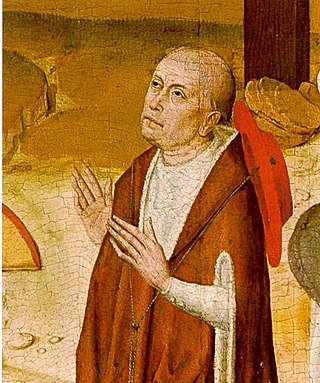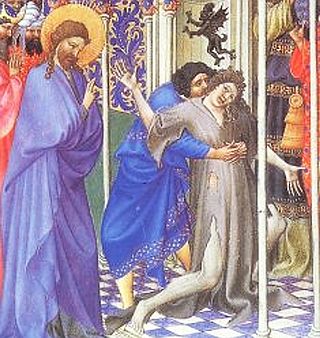
Anointing of the sick, known also by other names such as unction, is a form of religious anointing or "unction" for the benefit of a sick person. It is practiced by many Christian churches and denominations.
Theology is the study of religious belief from a religious perspective. More narrowly it is the study of the nature of the divine. It is taught as an academic discipline, typically in universities and seminaries. It occupies itself with the unique content of analyzing the supernatural, but also deals with religious epistemology, asks and seeks to answer the question of revelation. Revelation pertains to the acceptance of God, gods, or deities, as not only transcendent or above the natural world, but also willing and able to interact with the natural world and to reveal themselves to humankind.

The Christian doctrine of the Trinity is the central doctrine concerning the nature of God in most Christian churches, which defines one God existing in three coequal, coeternal, consubstantial divine persons: God the Father, God the Son and God the Holy Spirit, three distinct persons (hypostases) sharing one essence/substance/nature (homoousion). As the Fourth Lateran Council declared, it is the Father who begets, the Son who is begotten, and the Holy Spirit who proceeds. In this context, one essence/nature defines what God is, while the three persons define who God is. This expresses at once their distinction and their indissoluble unity. Thus, the entire process of creation and grace is viewed as a single shared action of the three divine persons, in which each person manifests the attributes unique to them in the Trinity, thereby proving that everything comes "from the Father," "through the Son," and "in the Holy Spirit."
Christian philosophy includes all philosophy carried out by Christians, or in relation to the religion of Christianity. Christian philosophy emerged with the aim of reconciling science and faith, starting from natural rational explanations with the help of Christian revelation. Several thinkers such as Origen of Alexandria and Augustine believed that there was a harmonious relationship between science and faith, others such as Tertullian claimed that there was contradiction and others tried to differentiate them.

Nicholas of Cusa, also referred to as Nicholas of Kues and Nicolaus Cusanus, was a German Catholic cardinal and polymath active as a philosopher, theologian, jurist, mathematician and astronomer. One of the first German proponents of Renaissance humanism, he made spiritual and political contributions in European history. A notable example of this is his mystical or spiritual writings on "learned ignorance," as well as his participation in power struggles between Rome and the German states of the Holy Roman Empire.
Ascetical theology is the organized study or presentation of spiritual teachings found in Christian Scripture and the Church Fathers that help the faithful to more perfectly follow Christ and attain to Christian perfection. Christian asceticism is commonly thought to imply self-denial for a spiritual purpose. The term ascetical theology is used primarily in Roman Catholic theology; Eastern Orthodox theology carries its own distinct terms and definitions, and other religious traditions conceive of following and conforming to God and Christ differently from either Orthodoxy or Catholicism.
The Johannine Comma is an interpolated phrase (comma) in verses 5:7–8 of the First Epistle of John.
John Scotus Eriugena, also known as Johannes Scotus Erigena, John the Scot, or John the Irish-born was an Irish Neoplatonist philosopher, theologian and poet of the Early Middle Ages. Bertrand Russell dubbed him "the most astonishing person of the ninth century". The Stanford Encyclopedia of Philosophy states that he "is the most significant Irish intellectual of the early monastic period. He is generally recognized to be both the outstanding philosopher of the Carolingian era and of the whole period of Latin philosophy stretching from Boethius to Anselm".
Hikmah is an Arabic word that means wisdom, sagacity, philosophy, rationale or underlying reason. The Quran mentions "hikmah" in various places, where it is understood as knowledge and understanding of the Quran, fear of God, and a means of nourishing the spirit or intellect. Hikmah is sometimes associated with prophethood, faith, intelligence ('aql), comprehension (fahm), or the power of rational demonstration. In the Quran, God bestows wisdom upon whomever He chooses, and various individuals including the House of Abraham, David, Joseph, Moses, Jesus, Muhammad and Luqman are said to have received wisdom. The Quran also uses the term hikmah in connection with the Book or the scripture in general. The Quran also refers to itself as the Wise Book, and refers to God as The Wise in several places.
Dóminus vobíscum is an ancient salutation and blessing traditionally used by the clergy in the Masses of the Catholic Church and other liturgies, as well as liturgies of other Western Christian denominations, such as Lutheranism, Anglicanism and Methodism.

Allegorical interpretations of Genesis are readings of the biblical Book of Genesis that treat elements of the narrative as symbols or types, rather than viewing them literally as recording historical events. Either way, Judaism and most sects of Christianity treat Genesis as canonical scripture, and believers generally regard it as having spiritual significance.
Marguerite Porete was a French-speaking mystic and the author of The Mirror of Simple Souls, a work of Christian mysticism dealing with the workings of agape. She was burnt at the stake for heresy in Paris in 1310 after a lengthy trial, refusing to remove her book from circulation or recant her views.

In Christianity, the Logos is a name or title of Jesus Christ, seen as the pre-existent second person of the Trinity. In the Douay–Rheims, King James, New International, and other versions of the Bible, the first verse of the Gospel of John reads:
In the beginning was the Word, and the Word was with God, and the Word was God.
Mystical theology is the branch of theology in the Christian tradition that deals with divine encounter and the self-communication of God with the faithful; such as to explain mystical practices and states, as induced by contemplative practices such as contemplative prayer, called theoria from the Greek for contemplation.

Lullism is a term for the philosophical and theological currents related to the thought of Ramon Llull. Lullism also refers to the project of editing and disseminating Llull's works. The earliest centers of Lullism were in fourteenth-century France, Mallorca, and Italy.

Trivialism is the logical theory that all statements are true and that all contradictions of the form "p and not p" are true. In accordance with this, a trivialist is a person who believes everything is true.
Fitra or fitrah is an Arabic word that means 'original disposition', 'natural constitution' or 'innate nature'. The concept somewhat resembles natural order in philosophy, although there are considerable differences as well. In Islam, fitra is the innate human nature that recognizes the oneness of God. It may entail either the state of purity and innocence in which Muslims believe all humans to be born, or the ability to choose or reject God's guidance. The Quran states that humans were created in the most perfect form (95:4), and were endowed with a primordial nature (30:30). Furthermore, God took a covenant from all children of Adam, even before they were sent to Earth's worldly realm, regarding his Lordship (7:172–173). This covenant is considered to have left an everlasting imprint on the human soul, with the Quran emphasizing that on the Day of Judgment no one will be able to plead ignorance of this event (7:172–173).

Debate exists as to whether the earliest Church Fathers in Christian history believed in the doctrine of the Trinity – the Christian doctrine that God the Father, the Son and the Holy Spirit are three distinct persons sharing one homoousion (essence).
In law, ignorantia juris non excusat, or ignorantia legis neminem excusat, is a legal principle holding that a person who is unaware of a law may not escape liability for violating that law merely by being unaware of its content.

In English translations of the Bible, unclean spirit is a common rendering of Greek pneuma akatharton, which in its single occurrence in the Septuagint translates Hebrew ruaḥ tum'ah.









